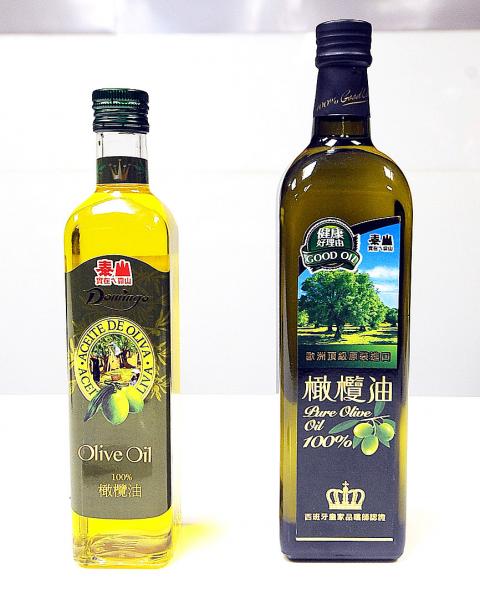The Ministry of Health and Welfare’s Food and Drug Administration (FDA) yesterday confirmed a media report that Spain had notified Taiwan as early as in 2009 about possible illicitly mixed oil products, but that officials did not take action at the time.
The Chinese-language Next Magazine edition published yesterday reported that the Spanish government notified Taiwan in 2009 and 2011 about some products manufactured by Taisun Enterprise Co (泰山企業) and Fwusow Industry (福壽油品) it suspected had been adulterated. The firms allegedly mixed imported olive pomace oil with other low-quality oil and sold the mix as pure olive oil.
The Spanish government listed two suspicious items, but the then-department of health ministers Yeh Chin-chuan (葉金川) and Yaung Chih-liang (楊志良) did not order an investigation into the products, the magazine said.

Photo: Fang Pin-chao, Taipei Times
FDA Director-General Yeh Ming-kung (葉明功) confirmed the report yesterday morning, adding that the agency had not been capable of carrying out tests at the time and could only ask importers to label their products appropriately.
He declined to elaborate.
Meanwhile, the two firms denied their extra-virgin olive oil products were adulterated and Taisun said it was considering taking legal action against the magazine.
The Greater Taichung Government’s health bureau said its inspection of Fwusow’s extra-virgin olive oil products found they conformed to standards and did not contain cottonseed oil.
However, at a FDA press conference yesterday afternoon, certain grapeseed oil products from Fwusow and Taisun were listed among 12 items found to contain copper chlorophyllin. The other products had been manufactured by Formosa Oilseed Processing Co (福懋油脂) and Ting Hsin International Group (頂新集團), both of which were previously found to have added inferior or banned substances and other oils to their oil products.
The 12 products will be removed from the shelves immediately for violating the Act Governing Food Sanitation (食品衛生管理法), FDA Northern Center for Regional Administration Director Feng Jun-lan (馮潤蘭) said.
In a bid to ease public concern, the agency published a list of 149 oil products that had been proven to be free of sodium copper chlorophyllin and copper chlorophyllin food colorants.
The list can be found on the FDA’s Web site (www.fda.gov.tw/TC/siteContent.aspx?sid=3719#1).
At a separate press conference, Democratic Progressive Party Legislator Chen Ting-fei (陳亭妃) said she would propose mandatory testing for imported oil to stop local manufacturers from mixing pure oil with low-quality varieties.
Local manufacturers would also be required to state the origin and repackaging location if their products had been reprocessed or repackaged.
Manufacturers are currently only required to provide the origin of the imported material on the labels, Chen said.
Taisun held a press conference yesterday evening to rebut the FDA’s announcement.
“We sent our grape seed oil to TUV Rheinland Aimex Ltd’s Taiwanese division for examination, and the result released on Oct. 28 confirmed that our oil does not contain copper chlorophyllin,” said Max Lei (雷松清), a special assistant to Taisun’s chairman.
Meanwhile, Fwusow said its grape seed oil was imported from Spain via Vidoria SL and it has not changed the oil’s content. Fwusow said it would sue Vidoria if the oil proves to be problematic.
Additional reporting by Camaron Kao and staff writer

CHAOS: Iranians took to the streets playing celebratory music after reports of Khamenei’s death on Saturday, while mourners also gathered in Tehran yesterday Iranian Supreme Leader Ayatollah Ali Khamenei was killed in a major attack on Iran launched by Israel and the US, throwing the future of the Islamic republic into doubt and raising the risk of regional instability. Iranian state television and the state-run IRNA news agency announced the 86-year-old’s death early yesterday. US President Donald Trump said it gave Iranians their “greatest chance” to “take back” their country. The announcements came after a joint US and Israeli aerial bombardment that targeted Iranian military and governmental sites. Trump said the “heavy and pinpoint bombing” would continue through the week or as long

TRUST: The KMT said it respected the US’ timing and considerations, and hoped it would continue to honor its commitments to helping Taiwan bolster its defenses and deterrence US President Donald Trump is delaying a multibillion-dollar arms sale to Taiwan to ensure his visit to Beijing is successful, a New York Times report said. The weapons sales package has stalled in the US Department of State, the report said, citing US officials it did not identify. The White House has told agencies not to push forward ahead of Trump’s meeting with Chinese President Xi Jinping (習近平), it said. The two last month held a phone call to discuss trade and geopolitical flashpoints ahead of the summit. Xi raised the Taiwan issue and urged the US to handle arms sales to

State-run CPC Corp, Taiwan (CPC, 台灣中油) yesterday said that it had confirmed on Saturday night with its liquefied natural gas (LNG) and crude oil suppliers that shipments are proceeding as scheduled and that domestic supplies remain unaffected. The CPC yesterday announced the gasoline and diesel prices will rise by NT$0.2 and NT$0.4 per liter, respectively, starting Monday, citing Middle East tensions and blizzards in the eastern United States. CPC also iterated it has been reducing the proportion of crude oil imports from the Middle East and diversifying its supply sources in the past few years in response to geopolitical risks, expanding

Pro-democracy media tycoon Jimmy Lai’s (黎智英) fraud conviction and prison sentence were yesterday overturned by a Hong Kong court, in a surprise legal decision that comes soon after Lai was jailed for 20 years on a separate national security charge. Judges Jeremy Poon (潘兆初), Anthea Pang (彭寶琴) and Derek Pang (彭偉昌) said in the judgement that they allowed the appeal from Lai, and another defendant in the case, to proceed, as a lower court judge had “erred.” “The Court of Appeal gave them leave to appeal against their conviction, allowed their appeals, quashed the convictions and set aside the sentences,” the judges